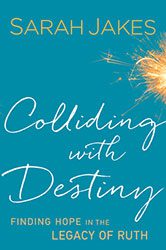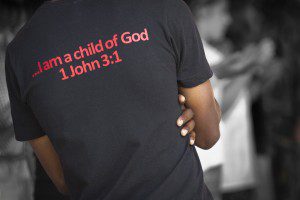 Colliding with Destiny: Finding Hope in the Legacy of Ruth, written by Sarah Jakes (daughter of Bishop T.D. Jakes), is a devotional centered on the story of Ruth designed to inspire women facing discouragement to have greater strength and faith while they await their moment of “collision” with the destiny God has planned for them. Each brief chapter contains an excerpt from the book of Ruth, a short contemporary anecdote (usually from Jakes’s own life) which she has chosen as exemplary of a value or lesson mirrored in the Scripture passage, and a sample prayer to recite with an accompanying series of journaling questions to help readers handle their daily challenges with greater power.
Colliding with Destiny: Finding Hope in the Legacy of Ruth, written by Sarah Jakes (daughter of Bishop T.D. Jakes), is a devotional centered on the story of Ruth designed to inspire women facing discouragement to have greater strength and faith while they await their moment of “collision” with the destiny God has planned for them. Each brief chapter contains an excerpt from the book of Ruth, a short contemporary anecdote (usually from Jakes’s own life) which she has chosen as exemplary of a value or lesson mirrored in the Scripture passage, and a sample prayer to recite with an accompanying series of journaling questions to help readers handle their daily challenges with greater power.
Perhaps the strongest endorsement for this book is Jakes’s own testimony. Having had her first child as a young teen and later finding herself the victim of adultery and divorce, the trials she has faced—undoubtedly made even more challenging by the spotlight of her parents’ ministry—make her credibility as one who has endured adversity and thrived in spite of it irrefutable. Jakes is generous in sharing her experiences and refreshingly unconcerned about what her past might “look like” to anyone ready to judge.
The organizing theological principle at the heart of this book is that God has great plans for each of our lives and that there are specific things we can do to get out of His (and our own) way in arriving at this destiny. Jakes’s positive attitude and tireless assurance that at any moment we will have the breakthrough we have been looking for will certainly encourage some readers. It is worth noting though that such a focus will also make other readers uncomfortable, maybe even discouraged, Jakes’s challenge, of course, being how to explain all the tragedy, disaster, conflict, crisis, depression, or pain that persists in the lives of many of God’s faithful, suffering that does not resolve or reap an abundance of positive fruit (at least not in this life). It may not always work for Jakes’s readers for her to characterize destiny as a moment of arrival or discovery rather than a trajectory of a life which may not necessarily end up looking successful or accomplished. These are not issues Jakes addresses. Journal questions about the things in our lives we are allowing to stand in the way of our destiny and which of our relationships are too negative and should be eliminated are fine questions to ask, but they will not lead some readers out of their wildernesses nor are they likely to speak to the concerns of Christians beyond the first world or in countries where persecution and even martyrdom are more common.
One way, for example, that Jakes might have addressed this disparity could have been a segment on the ways in which getting outside ourselves—getting beyond the search for what she calls our “true self”—by serving and working for others, contributes to experiencing the joy of Christ more directly. There are lots of things we can do to align our minds with God’s—prayer and immersion in His Word, for example—but it’s also true that there are also real limits on this, and we should be careful to not place too much faith in our own efforts. And surely it’s not just me, but Paul’s “thorn” seems often to be a more relatable experience of daily faith—the fleshly and constant awareness of my sin, the persistence of temptation that may plague us till death but that we endure with hope (though not necessarily without pain)—than a guaranteed restoration in this life that comes through like clockwork if we can just wait it out or take the right steps or cultivate the right mindset.
In addition, we must ask: so what does all of this have to do with Ruth? Jakes’s portrayal of Ruth is, as we might expect, in line with her theology: In Colliding with Destiny, Ruth’s story is written as the tale of a woman racked by sorrow at her first husband’s death, a woman who felt lost and abandoned by the God of her new religion when He widowed her, a woman who—because of faithful acts (following Naomi rather than abandoning her, choosing to remain a Jew rather than return to the pagan religion of Moab, serving industriously in Boaz’s fields until she is noticed and married off to him)—is ultimately launched into a relationship that every young American Christian girl has been taught to long for. Sometimes the connection between the scripture and the points Jake extracts seemed a little disjointed. The story of Ruth at times felt like a patina added on as an organizing principle for the various motivational points taught in each chapter rather than a central and foundationally-essential component of the text, and I wondered if Jakes might have done just as well to rely more centrally on her own inspiring testimony to make many of her points.
I will, as a final point, note that, though the connection between Ruth’s story and Jakes’s strategies for colliding with our destiny were not always as transparent as I might have liked, one of the greatest outcomes of having read this book for me was that I was inspired to go back to Ruth in my own Bible and to study her story independently. Jakes is right to have identified her as a character we can learn from, and I have since found myself not only rereading Ruth’s story in Scripture, but seeking out historical and theological studies on Ruth as well as historical fiction (John Piper’s A Sweet and Bitter Providence, John MacArthur’s Ruth & Esther, and Francine Rivers’s Unshaken are all great, if you’re looking for a starting point!). So while I did not always find Jakes’s tips and analysis as penetrating or personally-motivating as some readers undoubtedly will, the fact that this book turned me back to God’s Word with the desire to study it further and independently is a worthy accomplishment unto itself and certainly deserving of praise.
For more on Colliding with Destiny – and to read an excerpt – visit the Patheos Book Club here.
 Amber M. Stamper holds a Ph.D. in English (Rhetoric and Composition) and is an Assistant Professor of Language, Literature, and Communication at Elizabeth City State University in North Carolina. Her research and publications center on religious rhetoric and communication, especially issues of Christian evangelism and the digital church.
Amber M. Stamper holds a Ph.D. in English (Rhetoric and Composition) and is an Assistant Professor of Language, Literature, and Communication at Elizabeth City State University in North Carolina. Her research and publications center on religious rhetoric and communication, especially issues of Christian evangelism and the digital church.












